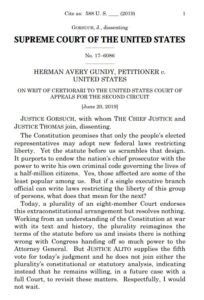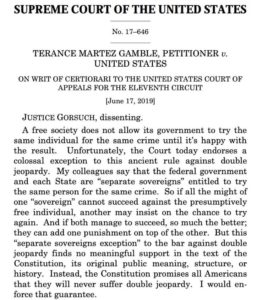On Wednesday, at a rally on the Supreme Court steps, Senate Minority Leader Chuck Schumer (D-N.Y.) cut loose with a truly amazing diatribe against Justices Neil Gorsuch and Brett Kavanaugh, declaring that the two would “pay the price” and “won’t know what hit you if you go forward with these awful decisions.” Schumer’s menacing if vague comments drew prompt disapproval from a broad range of legal figures, such as the heads of the American Bar Association and New York City Bar Association as well as Democratic SCOTUS shortlister Neal Katyal and Harvard’s Larry Tribe. Chief Justice John Roberts weighed in with a rare public rebuke: “threatening statements of this sort from the highest levels of government are not only inappropriate, they are dangerous.”
Schumer proceeded to dig in and even blast Roberts personally for the criticism. By Thursday, he was ready to concede grudgingly that he “should not have used the words I used. They didn’t come out the way I intended to,” while still staying on the offensive in every other respect and accusing his adversaries of “manufacturing” the uproar.
I’ve got a new post at Ricochet reviewing the controversy, including its much-echoed “what about…?” dimension:
Defenders of Schumer assailed the chief justice for not having weighed on some other inappropriate Trump sallies, including his ill-grounded speculation recently (never filed as an actual motion) that Justices Ruth Ginsburg and Sonia Sotomayor should recuse themselves from Trump matters, and his aspersions on the judge in the Roger Stone case. Those are part of a frequent and blatant Trump habit of trash-talking judges, both as a candidate (calling the judge in the Trump University case “Mexican” and “a hater”) and as President (“so-called judge” among numerous others). Some — I’m one — would say that this is among Trump’s very worst and most damaging patterns of behavior.
But as cooler heads noted, including Ruth Marcus of the Washington Post, the chief justice is not a playground proctor who can step in to write up every demerit; he needs to save his efforts for the instances that are most dangerous, as he in fact has done.
The wider picture, it might be noted, is one in which nasty swipes at judges have been routinized for years, from a range of public figures and also from former President Barack Obama, both in his 2010 State of the Union speech and also repeatedly during the court review of ObamaCare. Still, none of these have gone as far to suggest personal threat as did Schumer — not even the extraordinarily inappropriate amicus brief filed by Sens. Sheldon Whitehouse and four other Senate Democrats last August, assailing the Court’s legitimacy and warning that “restructuring” at the hands of political branches lies ahead if it does not mend its ways.
I conclude that Schumer needs to go back and apologize, seriously this time. And it’s time for all who’ve fallen short of defending judicial independence — Republicans and Democrats alike — to do so. [cross-posted from Cato at Liberty]


